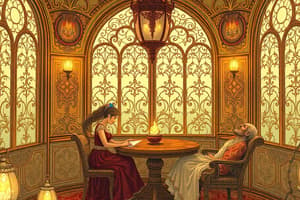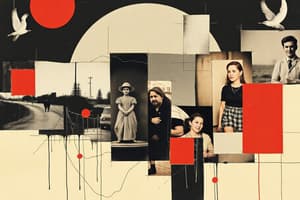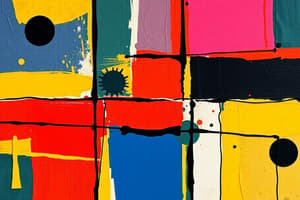Podcast
Questions and Answers
Which of the following best describes the primary function of literary theory?
Which of the following best describes the primary function of literary theory?
- To offer biographical information about authors and their personal lives.
- To dictate the 'correct' interpretation of literary works.
- To provide a framework for understanding the principles that shape literary interpretation. (correct)
- To summarize the plots of well-known literary texts.
Which critical approach focuses on the inherent structures within a text, drawing parallels to linguistics and anthropology?
Which critical approach focuses on the inherent structures within a text, drawing parallels to linguistics and anthropology?
- Structuralism (correct)
- Reader-response theory
- Formalism
- Post-structuralism
A literary critic is analyzing a novel, focusing on its use of imagery, symbolism, and narrative structure, disregarding the author's biography or the historical context. Which theoretical lens are they most likely using?
A literary critic is analyzing a novel, focusing on its use of imagery, symbolism, and narrative structure, disregarding the author's biography or the historical context. Which theoretical lens are they most likely using?
- Formalism (correct)
- Psychoanalytic Criticism
- Marxist Criticism
- New Historicism
Which of these approaches challenges the notion of stable meaning and emphasizes the role of context in shaping interpretation?
Which of these approaches challenges the notion of stable meaning and emphasizes the role of context in shaping interpretation?
Which theoretical perspective would analyze a literary text through the lens of class conflict and economic inequality?
Which theoretical perspective would analyze a literary text through the lens of class conflict and economic inequality?
A critic interprets a poem by exploring the unconscious desires and repressed anxieties of the author, using Freudian concepts. Which theory are they applying?
A critic interprets a poem by exploring the unconscious desires and repressed anxieties of the author, using Freudian concepts. Which theory are they applying?
Which critical approach examines literature by challenging patriarchal assumptions and focusing on the experiences and perspectives of women?
Which critical approach examines literature by challenging patriarchal assumptions and focusing on the experiences and perspectives of women?
Edward Said's 'Orientalism' is a foundational text for which area of literary theory?
Edward Said's 'Orientalism' is a foundational text for which area of literary theory?
Which theory posits that the meaning of a text is not inherent but is actively constructed by the individual reader?
Which theory posits that the meaning of a text is not inherent but is actively constructed by the individual reader?
A literary scholar analyzes a play, considering its historical context, the social norms of the time, and the power dynamics reflected in the text. Which approach is being used?
A literary scholar analyzes a play, considering its historical context, the social norms of the time, and the power dynamics reflected in the text. Which approach is being used?
Viktor Shklovsky's concept of 'defamiliarization' is most closely associated with which critical school?
Viktor Shklovsky's concept of 'defamiliarization' is most closely associated with which critical school?
Which theorist applied structuralist principles to the study of mythology and culture?
Which theorist applied structuralist principles to the study of mythology and culture?
Jacques Derrida's concept of 'deconstruction' is central to which theoretical approach?
Jacques Derrida's concept of 'deconstruction' is central to which theoretical approach?
The 'Oedipus complex' is a central concept in which school of literary theory?
The 'Oedipus complex' is a central concept in which school of literary theory?
Which theorist is most closely associated with the development of Marxist theory?
Which theorist is most closely associated with the development of Marxist theory?
Which approach examines how literature perpetuates or challenges societal norms and stereotypes related to gender?
Which approach examines how literature perpetuates or challenges societal norms and stereotypes related to gender?
Which theoretical framework examines literature concerning the impact of colonialism and its effects on culture and identity?
Which theoretical framework examines literature concerning the impact of colonialism and its effects on culture and identity?
Wolfgang Iser's concept of the 'implied reader' is central to which area of literary study?
Wolfgang Iser's concept of the 'implied reader' is central to which area of literary study?
Stephen Greenblatt is a prominent figure associated with which school of literary theory?
Stephen Greenblatt is a prominent figure associated with which school of literary theory?
Which statement best describes the practical application of literary theory?
Which statement best describes the practical application of literary theory?
Flashcards
Literary Theory
Literary Theory
The systematic study of the nature of literature and the methods used to analyze it.
Theory in Literature
Theory in Literature
A framework of ideas and principles used for interpreting literature.
Formalism
Formalism
Focuses on the text's structure, language, and literary devices, disregarding external factors.
Structuralism
Structuralism
Signup and view all the flashcards
Post-Structuralism
Post-Structuralism
Signup and view all the flashcards
Psychoanalytic Criticism
Psychoanalytic Criticism
Signup and view all the flashcards
Marxist Criticism
Marxist Criticism
Signup and view all the flashcards
Feminist Criticism
Feminist Criticism
Signup and view all the flashcards
Postcolonial Criticism
Postcolonial Criticism
Signup and view all the flashcards
Reader-Response Theory
Reader-Response Theory
Signup and view all the flashcards
New Historicism
New Historicism
Signup and view all the flashcards
Focus of Formalism
Focus of Formalism
Signup and view all the flashcards
Defamiliarization
Defamiliarization
Signup and view all the flashcards
Structuralist Focus
Structuralist Focus
Signup and view all the flashcards
Nature of Meaning (Post-Structuralism)
Nature of Meaning (Post-Structuralism)
Signup and view all the flashcards
Psychoanalytic Goal
Psychoanalytic Goal
Signup and view all the flashcards
Role of Literature (Marxist)
Role of Literature (Marxist)
Signup and view all the flashcards
Feminist Perspective
Feminist Perspective
Signup and view all the flashcards
Postcolonial Themes
Postcolonial Themes
Signup and view all the flashcards
Reader Focus
Reader Focus
Signup and view all the flashcards
Study Notes
- Literary theory is the systematic study of the nature of literature and of the methods for analyzing literature.
- It is not a guide to interpreting specific texts, but rather a framework for understanding the underlying principles and assumptions that shape the way we read and interpret literature.
- Literary theory is a diverse field, encompassing a wide range of approaches and perspectives.
Key Concepts in Literary Theory
- Theory provides a framework of ideas for interpreting literature.
- It is a set of principles used to understand and analyze literary texts.
- Literary theory questions assumptions about literature, language, and meaning.
- It examines the relationship between the text, author, reader, and context.
Major Schools of Literary Theory
- Formalism focuses on the text itself, analyzing its structure, language, and literary devices, without considering external factors like the author's life or historical context.
- Structuralism examines underlying structures and systems of relationships in literature, drawing on linguistics and anthropology.
- Post-structuralism challenges the idea of fixed meanings and stable structures, emphasizing the instability and fluidity of language.
- Psychoanalytic criticism applies the theories of psychoanalysis, particularly those of Sigmund Freud, to the interpretation of literature, exploring the unconscious desires and anxieties of characters and authors.
- Marxist criticism examines literature in its social, economic, and political context, focusing on issues of class struggle, power, and ideology.
- Feminist criticism examines literature from a feminist perspective, challenging patriarchal assumptions and exploring the experiences and perspectives of women.
- Postcolonial criticism examines literature in relation to colonialism and its aftermath, focusing on issues of identity, power, and representation.
- Reader-response theory emphasizes the role of the reader in creating meaning, arguing that the meaning of a text is not fixed but is constructed by the reader's interpretation.
- New Historicism examines literature in its historical and cultural context, focusing on the interplay between literature and history.
Formalism
- Focuses on the formal features of a text like structure, style, and literary devices.
- Meaning is derived from the text itself, not external factors.
- Russian Formalism (early 20th century) sought a scientific basis for literary study.
- Key figures include Viktor Shklovsky and Roman Jakobson.
- Defamiliarization (making the familiar strange) is a key concept.
- Close reading is the primary method of analysis.
Structuralism
- Examines underlying structures and systems of relationships in literature.
- Influenced by linguistics (Saussure) and anthropology (Lévi-Strauss).
- Focuses on patterns, codes, and conventions.
- Seeks universal structures in literature.
- Claude Lévi-Strauss: Applied structuralism to mythology and culture.
- Roland Barthes: Explored the structuralist analysis of narratives.
Post-Structuralism
- Challenges the idea of fixed meanings and stable structures.
- Emphasizes the instability and fluidity of language.
- Deconstruction is a key method (Jacques Derrida).
- Meaning is always deferred and dependent on context.
- Michel Foucault: Examined the relationship between power, knowledge, and discourse.
- Rejects the idea of a single, correct interpretation.
Psychoanalytic Criticism
- Applies the theories of psychoanalysis (Freud, Lacan) to literature.
- Explores the unconscious desires and anxieties of characters and authors.
- Oedipus complex: A key concept in understanding character motivations.
- Interpretation involves uncovering hidden meanings and symbols.
- Sigmund Freud: Developed psychoanalytic theory.
- Jacques Lacan: Reinterpreted Freud's theories in terms of language and structure.
Marxist Criticism
- Examines literature in its social, economic, and political context.
- Focuses on issues of class struggle, power, and ideology.
- Literature is seen as a product of its historical and material conditions.
- Karl Marx: Developed the theories of Marxism.
- Examines how dominant ideologies are reflected in literature.
- Considers the role of literature in perpetuating or challenging social inequalities.
Feminist Criticism
- Examines literature from a feminist perspective.
- Challenges patriarchal assumptions and explores the experiences and perspectives of women.
- Questions gender roles and stereotypes.
- Explores issues of female identity, power, and representation.
- Examines the portrayal of women in literature.
- Seeks to recover and re-evaluate works by women writers.
Postcolonial Criticism
- Examines literature in relation to colonialism and its aftermath.
- Focuses on issues of identity, power, and representation.
- Explores the impact of colonialism on colonized peoples and cultures.
- Edward Said: Pioneered postcolonial theory with "Orientalism."
- Gayatri Chakravorty Spivak: Examined the subaltern and representation.
- Explores the themes of hybridity, diaspora, and cultural identity.
Reader-Response Theory
- Emphasizes the role of the reader in creating meaning.
- Argues that the meaning of a text is not fixed but is constructed by the reader's interpretation.
- Different readers may interpret the same text differently.
- Wolfgang Iser: Developed the concept of the implied reader.
- Stanley Fish: Argued that interpretation is community-based.
- Focuses on the reading experience and the reader's interaction with the text.
New Historicism
- Examines literature in its historical and cultural context.
- Focuses on the interplay between literature and history.
- Literature is seen as both a product of and a reflection of its time.
- Stephen Greenblatt: A key figure in New Historicism.
- Examines the power dynamics and social practices reflected in literature.
- Considers the historical context in shaping literary meaning.
Practical Application of Literary Theory
- Choosing a theory depends on the text and the critical questions being asked.
- Theory provides a lens through which to analyze and interpret literature.
- Application of theory can reveal hidden meanings and complexities.
- Understanding different theories enhances critical thinking.
Importance of Literary Theory
- Provides tools for analyzing and interpreting literature.
- Enhances critical thinking and analytical skills.
- Encourages deeper understanding of texts and their contexts.
- Broadens perspectives on literature and culture.
- Fosters intellectual curiosity and engagement with ideas.
Studying That Suits You
Use AI to generate personalized quizzes and flashcards to suit your learning preferences.




